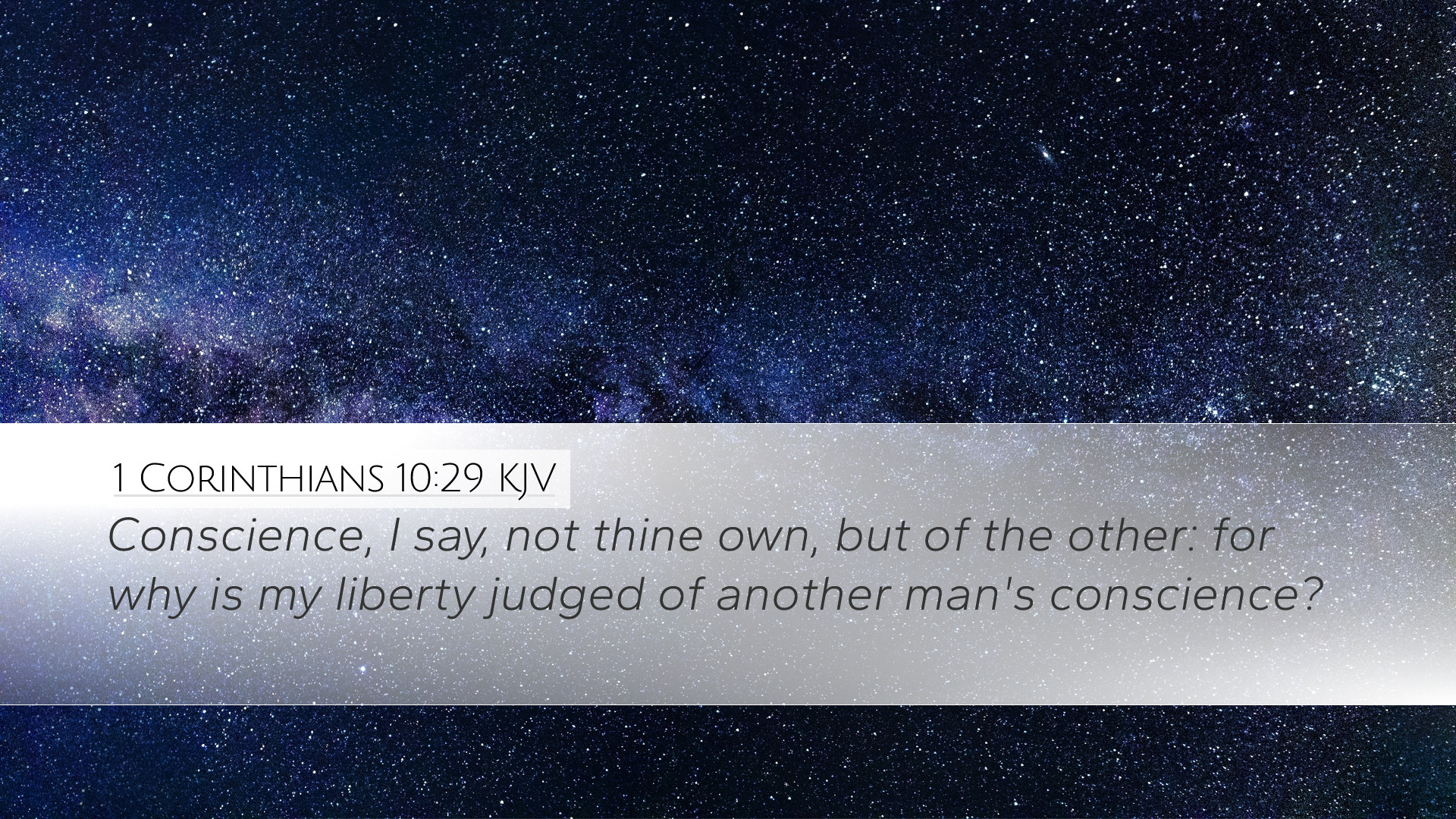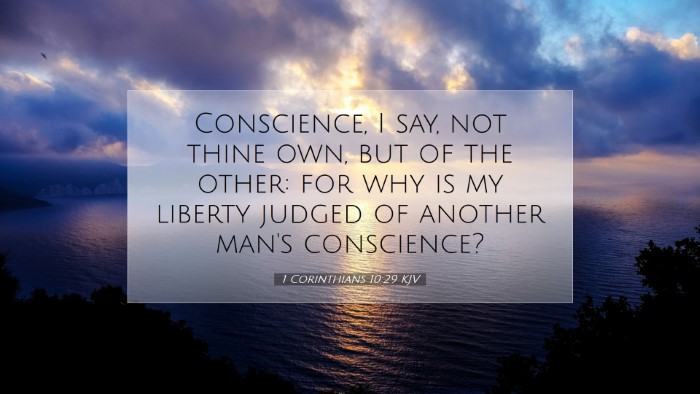Commentary on 1 Corinthians 10:29
Verse: “Conscience, I say, not thine own, but of the other: for why is my liberty judged of another man's conscience?”
General Overview
The Apostle Paul addresses the issue of Christian liberty in this passage. It articulately reflects the balance between freedom in Christ and the responsibility of not leading others into sin. Drawing from the insights of esteemed commentators such as Matthew Henry, Albert Barnes, and Adam Clarke, we see a rich tapestry of applications and interpretations that are pertinent for pastoral guidance, theological study, and biblical exposition.
Contextual Analysis
In the broader context of 1 Corinthians, Paul deals with various issues faced by the Corinthian church, particularly concerning food offered to idols and the exercise of Christian liberty. Here, he emphasizes the need for sensitivity to the consciences of others, especially the weaker brethren.
Matthew Henry's Insights
Matthew Henry points out the apostle's focus on conscience and the consideration of others. He states that while believers possess liberty in Christ, this liberty must be tempered with love and awareness of the effect it has on others. “It is a fundamental principle of Christianity,” he writes, “that our actions should promote goodwill rather than hurt the conscience of our brethren.”
Albert Barnes' Observations
Albert Barnes offers a detailed exposition on the implications of liberty. He emphasizes that the question of conscience is paramount: “Although one may have the liberty to act in a certain way, if that action offends the conscience of another, it should be reconsidered.” Barnes stresses the moral responsibility believers have, suggesting that we should live in such a way as to not cause another's conscience to stumble. He encourages the view that true knowledge of liberty is exercised under the law of love.
Adam Clarke's Commentary
Adam Clarke elaborates on the psychological implications of the verse. He notes that the conscience can be influenced positively or negatively by the actions of others. “A strong conscience may bear a heavier burden than a weak one,” he states, highlighting the need for maturity in understanding one’s freedom in Christ. Clarke provides a practical application by encouraging believers to act with the edification of their fellow believers in mind. He suggests that Paul is urging individuals to be accountable for their influence on the spiritual lives of others.
Theological Implications
The theological implications of 1 Corinthians 10:29 are manifold. The relationship between liberty and love is a central theme. Paul invites us to consider liberty through the lens of ethical responsibility. “One’s freedom must not lead to another’s downfall,” as Henry posits. The nature of Christian freedom is thus tied intricately to the community and the moral fabric that binds believers together. Liberty is not merely personal but communal.
Applications of the Passage
This passage is vital for practical theology and the daily life of believers. Below are applications derived from the insights of the aforementioned commentators:
- Awareness of Others: Believers should be conscious of the impact of their choices on fellow Christians, especially those who may be more vulnerable in their faith.
- Ethical Living: The freedom that comes with Christ does not permit one to act selfishly. Consideration should be given to how one’s actions reflect the teachings of Christ.
- Promoting Unity: Actions should foster unity within the body of Christ rather than division. This requires humility and a servant attitude.
- Educating the Conscience: The role of teaching is vital in forming and shaping the conscience. Pastors and leaders must guide their communities through Scripture.
- Love Over Knowledge: Knowledge may lead to pride, but love builds up. This is the essential principle guiding Christian behavior.
Conclusion
In summation, 1 Corinthians 10:29 serves as a powerful reminder of the balance between liberty and responsibility. As Paul instructs the Corinthian church, the exercise of one’s freedoms must always be subjected to the consideration of others. The collective insights of Matthew Henry, Albert Barnes, and Adam Clarke illuminate this verse's theological and practical depth. Believers are reminded to navigate their liberties with grace, love, and a deep concern for the spiritual welfare of one another.


